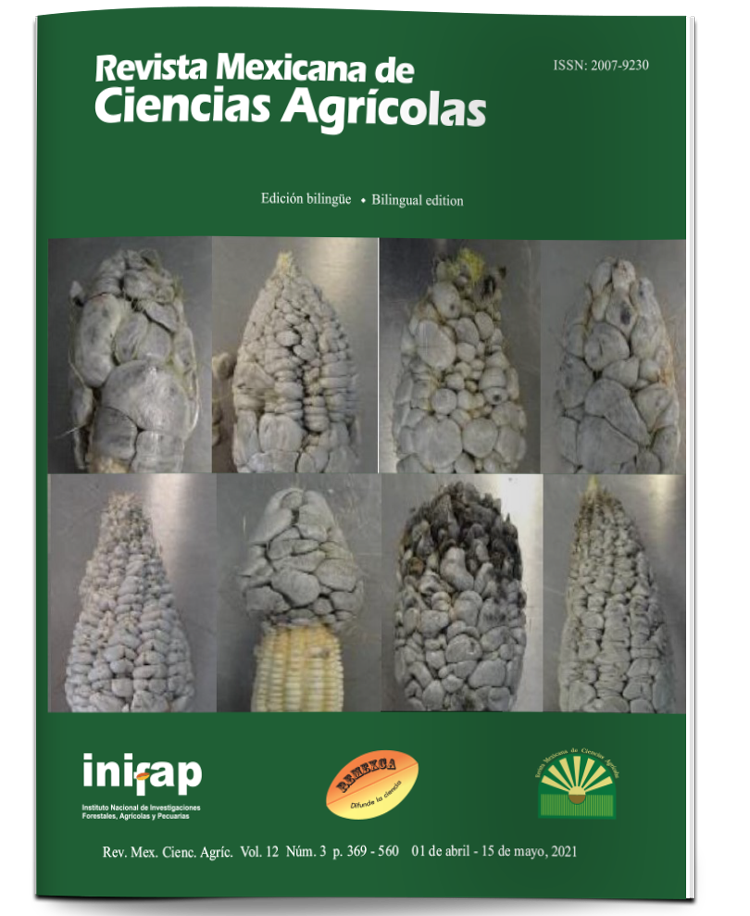Influence of Bacillus sp. on soil chemical and microbiological attributes and development of soybean and maize
DOI:
https://doi.org/10.29312/remexca.v12i3.2609Keywords:
Glycine max, Zea mays, inoculants, plant growth promotion rizobacteria, soil quality of bioindicatorsAbstract
Plant growth-promoting rhizobacteria (PGPR) inhabit the rhizosphere of several cultivated plants. Bacteria of the genus Bacillus have great functional importance in plant development. The objective of this research was to evaluate different doses of Bacillus sp. in the development of soybean and corn crops and in the chemical and microbiological attributes of the soil. The essays were conducted in the field in the 2016/2017 harvest. The soybean and corn seeds were treated with two doses of Bacillus sp. at a concentration of 109 CFU ml-1, with 10 and 20 ml of 100 kg of seed used in soybeans and 80 and 100 ml of 100 kg of seed in corn. The experiments were completely randomized in block with four repetitions. Chemical and microbiological attributes and plant development were evaluated. The results showed that the microbial activity was achieved at the dose of 20 ml of Bacillus sp. and positively influenced the weight of the grains and soybean productivity. In corn crops, the dose of 80 ml of Bacillus sp. showed better performance on chemical and microbiological attributes, resulting in increased shoot and root mass, and a significant increase in productivity. From the results obtained, it can be concluded that the use of Bacillus sp. it is a viable alternative for sustainable agriculture, and the dose of 20 ml and 80 ml of 100 kg of soybean and corn seeds, respectively, presented better results in microbial activity and in the development of plants.
Downloads
Downloads
Published
How to Cite
Issue
Section
License
The authors who publish in Revista Mexicana de Ciencias Agrícolas accept the following conditions:
In accordance with copyright laws, Revista Mexicana de Ciencias Agrícolas recognizes and respects the authors’ moral right and ownership of property rights which will be transferred to the journal for dissemination in open access. Invariably, all the authors have to sign a letter of transfer of property rights and of originality of the article to Instituto Nacional de Investigaciones Forestales, Agrícolas y Pecuarias (INIFAP) [National Institute of Forestry, Agricultural and Livestock Research]. The author(s) must pay a fee for the reception of articles before proceeding to editorial review.
All the texts published by Revista Mexicana de Ciencias Agrícolas —with no exception— are distributed under a Creative Commons License Attribution-NonCommercial 4.0 International (CC BY-NC 4.0), which allows third parties to use the publication as long as the work’s authorship and its first publication in this journal are mentioned.
The author(s) can enter into independent and additional contractual agreements for the nonexclusive distribution of the version of the article published in Revista Mexicana de Ciencias Agrícolas (for example include it into an institutional repository or publish it in a book) as long as it is clearly and explicitly indicated that the work was published for the first time in Revista Mexicana de Ciencias Agrícolas.
For all the above, the authors shall send the Letter-transfer of Property Rights for the first publication duly filled in and signed by the author(s). This form must be sent as a PDF file to: revista_atm@yahoo.com.mx; cienciasagricola@inifap.gob.mx; remexca2017@gmail.
This work is licensed under a Creative Commons Attribution-Noncommercial 4.0 International license.



